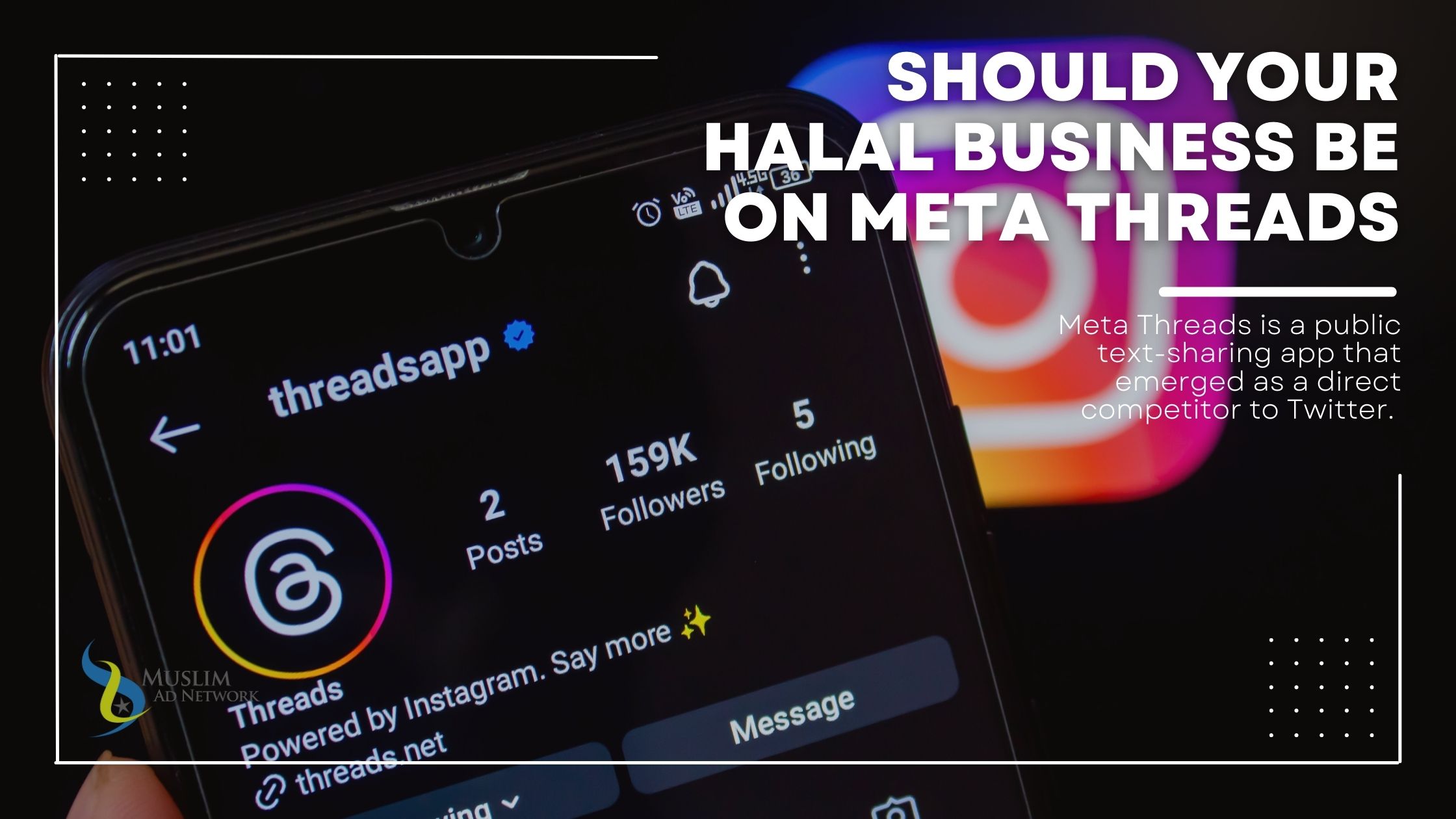
The key for Muslim businesses and entrepreneurs in becoming successful is staying on top of the marketing and social media trends and changes. One of the biggest players to keep an eye on is Meta which owns WhatsApp, Facebook, Instagram, and now Meta Threads. We take a look at Meta Threads and whether you should start using it for your halal business.
What is Meta Threads?
Meta Threads is a public text-sharing app that emerged as a direct competitor to Twitter. It was launched as a part of Meta, a social media giant that includes Instagram, Facebook, and WhatsApp. The platform gained immense popularity quickly, partly due to its association with Instagram, which allowed easy sign-up and linkage of Threads accounts for existing Instagram users.
Meta Threads has achieved the distinction of being the fastest-downloaded app to date. Before, ChatGPT held that record, garnering one million downloads within its initial five days of launch. However, Threads surpassed all expectations by amassing an astounding 30 million downloads within just one day of its release on June 5, 2023. Within a mere week of its debut, Threads skyrocketed to an impressive 100 million users.
The rise of Meta Threads was also fueled by the decline of Twitter, where many users became dissatisfied with the management under Elon Musk. Changes at Twitter, such as a daily read limit, controversial account reinstatements, and paid verification, led to some users migrating to Threads, causing a significant drop in Twitter’s traffic.
Threads positioned itself as a more positive alternative to Twitter, offering features such as longer text posts, five-minute video posts, and accessibility features like screen-reader support and alt text. It also integrated existing Instagram user safety controls and provided a feed with posts from followed accounts and recommended content.
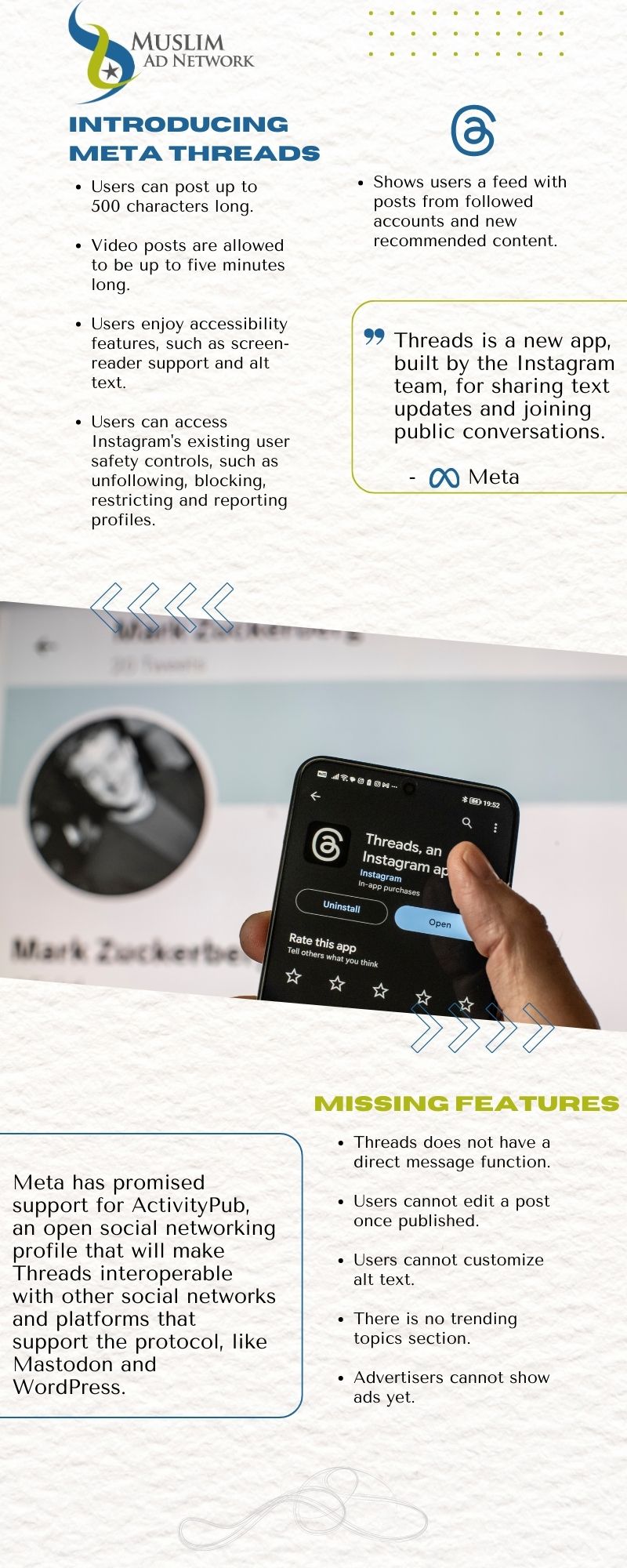
Although Threads had overnight success, it remains uncertain whether it will completely replace Twitter. However, Threads’ growth prospects seem promising, considering its early adoption by notable figures, including politicians and celebrities. The platform aims to continue adding more features in the future.
One of the key features that Meta has promised for Threads, but hasn’t implemented yet, is support for ActivityPub, which would enable interoperability with other social networks and platforms like Mastodon and WordPress. The concept of the “fediverse” is introduced, where interconnected servers host separate but interoperable internet platforms, allowing users from different platforms to interact with each other. However, this raises data privacy concerns as Threads users entering the fediverse would share their information with third-party services not controlled by Meta.
Overall, Meta Threads has emerged as a strong competitor to Twitter, attracting users through its association with Instagram and offering a more positive user experience. Whether it will fully replace Twitter or revolutionize the microblogging space remains to be seen, but its early success suggests that it has the potential to shake up the market.
A Case for Threads for Muslim Businesses
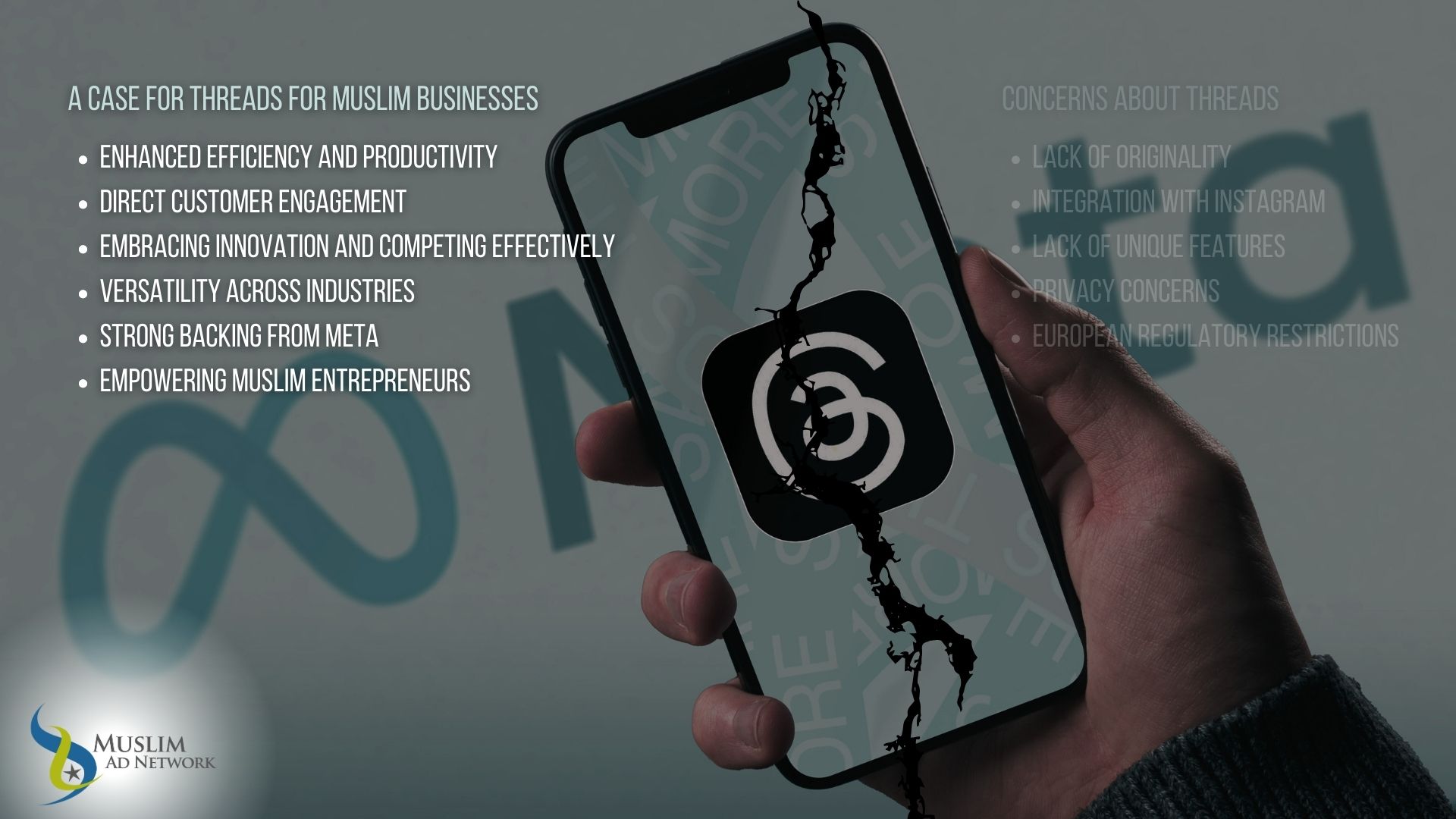
Meta Threads offers Muslim businesses a powerful platform to optimize their operations, engage with customers, and thrive in a competitive market. Incorporating this innovative tool into their marketing strategy can lead to improved efficiency, productivity, and growth, making it a valuable asset for any Muslim business. Let’s see how:
Enhanced Efficiency and Productivity: Meta Threads is designed to create an interconnected network of ideas, strategies, and actions, allowing businesses to streamline their operations. This can greatly benefit Muslim businesses, helping them manage multiple tasks, meet deadlines, and handle responsibilities more effectively. By adopting Meta Threads, businesses can improve productivity and foster growth.
Direct Customer Engagement: Threads offers features like liking, commenting, and reposting, enabling direct interaction with the audience. This presents a valuable opportunity for Muslim businesses to build strong connections with their customers, creating a sense of community and loyalty. Engaging with customers in real time, responding to their comments, and addressing their queries can lead to improved customer relationships and overall business performance.
Embracing Innovation and Competing Effectively: The future of entrepreneurship with Meta Threads looks promising, with rapid growth and widespread adoption. Utilizing this innovative tool can help Muslim businesses stay ahead of the competition and compete on equal footing with established players. Meta Threads’ decentralization empowers startups, giving them more control over algorithms and content, and fostering a more competitive environment.
Versatility Across Industries: Meta Threads is suitable for all types of businesses, whether they are tech startups, marketing agencies, manufacturing companies, or any other industry. Real-life examples demonstrate how Threads can be a game-changer, regardless of a business’s size or sector.
Strong Backing from Meta: The support and positive outlook expressed by Mark Zuckerberg, the CEO of Meta, demonstrates the corporation’s commitment to the success of Meta Threads. This level of support can provide businesses with confidence in adopting the platform.
Empowering Muslim Entrepreneurs: By leveraging the capabilities of Meta Threads, Muslim businesses can enhance their operations, connect with customers more effectively, and achieve their growth objectives. Embracing this tool can empower Muslim entrepreneurs to navigate the complexities of the business world with greater confidence.
Meta Threads Critical Review
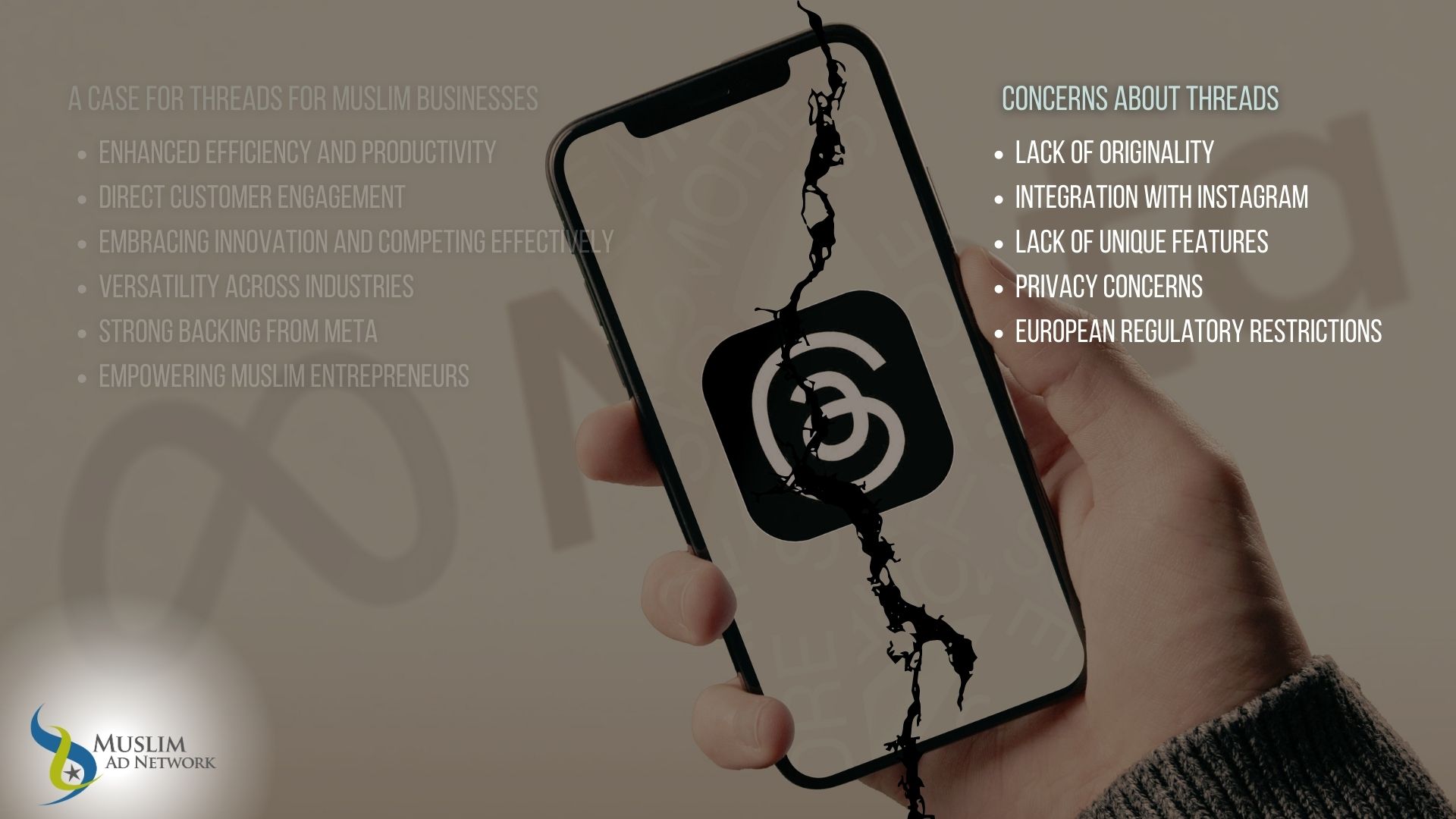
Meta Threads appears to lack originality and unique features, relying on copying Twitter’s model instead. The integration with Instagram also brings its own set of issues, and the app’s data collection practices raise privacy concerns. The app’s longevity and ability to compete with established platforms are questionable, and the absence in the European market due to regulatory restrictions adds to its negative image. We would advise Muslim businesses to carefully consider these aspects before investing time and data into Meta Threads.
Lack of Originality: One can argue that Threads is a blatant attempt by Meta to create a carbon copy of Twitter. The name itself, “Threads,” is a direct reference to a feature on Twitter. This lack of originality raises questions about Meta’s ability to innovate and offer something genuinely new to users.
Integration with Instagram: While the integration with Instagram may have been seamless, it also brings some issues. Users end up auto-populating their feeds with people they follow on Instagram, which may not necessarily align with their interests in Threads. This defeats the purpose of having a separate platform for microblogging and could result in a cluttered and less enjoyable user experience.
Lack of Unique Features: Threads seems to offer a familiar experience similar to Twitter, without introducing any groundbreaking features. Users are already accustomed to Twitter’s likes, retweets, and following, making Threads feel like a redundant duplicate rather than an innovative alternative.
Privacy Concerns: There are concerns about Meta’s data collection practices which we will get into more later on. The app is said to collect a wide range of personal information, raising privacy and security issues for users. This lack of transparency and potential misuse of user data could be a significant drawback for many users.
European Regulatory Restrictions: The fact that Threads is not available in the European Union due to data privacy concerns further highlights the potential risks associated with using the app and adds to its negative reputation.
Privacy is Always a Concern with Meta
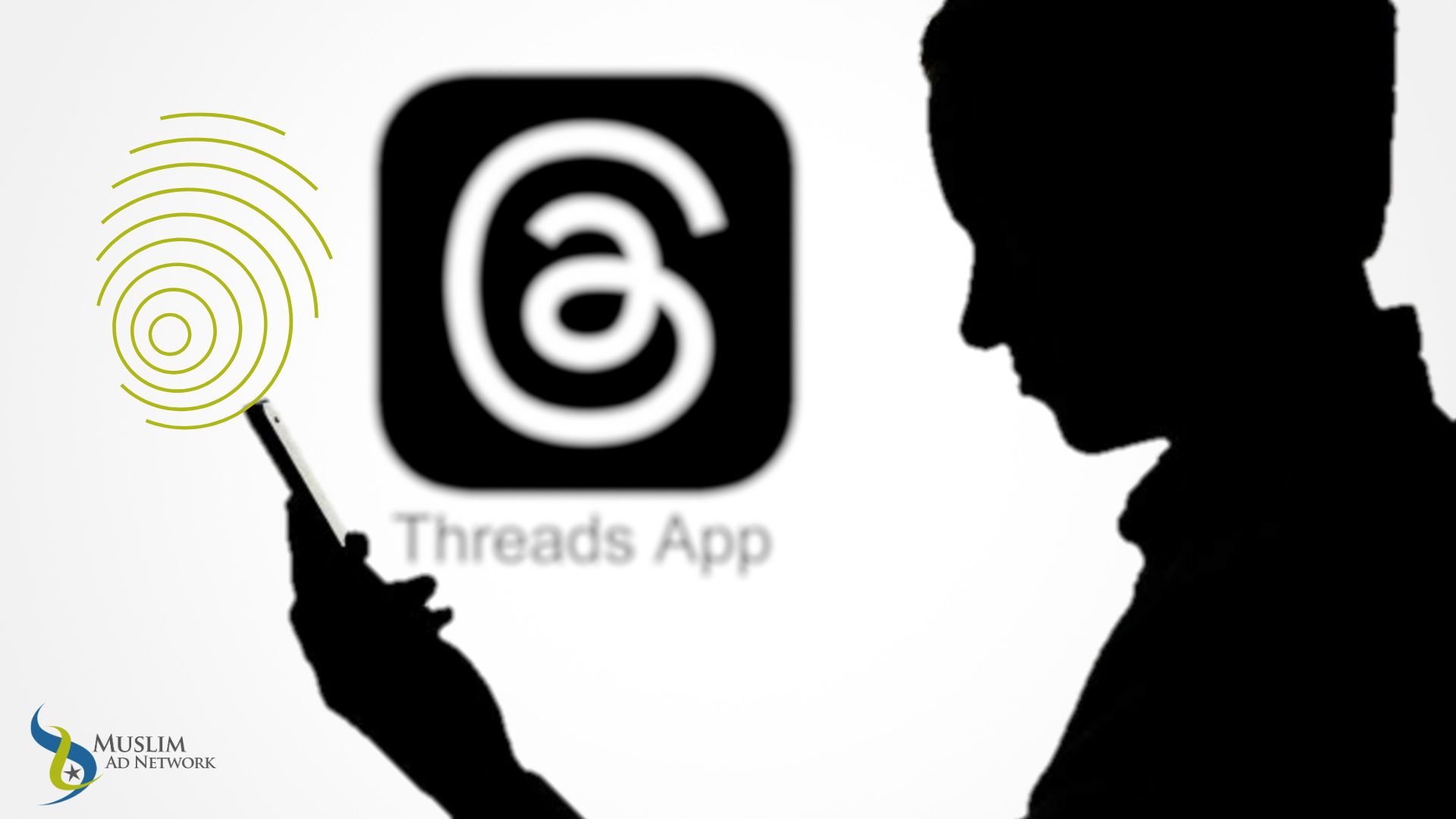
Muslim businesses must be cautious about using the Threads app and other Meta-owned platforms for business purposes, especially if they handle sensitive customer information. Recommending strict data protection measures, transparent privacy policies, and considering alternative platforms with stronger privacy practices may be essential to safeguarding their users’ privacy. The following are the key privacy concerns related to Meta’s Threads app:
Rapid Growth and Lack of Transparency: Meta’s Threads app has experienced exponential growth, reaching 100 million users in a short period. However, privacy experts are concerned that many users may not realize the extent of information the app collects. Meta’s history of mishandling sensitive information and its lack of transparency regarding the purpose of data collection raises red flags.
European Union Privacy Regulations: Meta had to put the launch of Threads in the European Union on hold due to uncertainties about how the company handles user data and shares it across different platforms. This has raised concerns about potential violations of privacy regulations in the EU.
Extensive Data Collection: Threads, like other Meta-owned platforms, collects a vast amount of data on its users. This includes sensitive information such as health and fitness data, financial information, location data, browsing history, and more. The combination of data from Threads and other Meta-owned platforms allows the company to create highly detailed profiles of users’ lives.
Data Sharing With Third Parties: Meta’s primary goal is selling targeted advertisements, and the data collected from Threads may be used as part of a larger ecosystem for ad targeting on other platforms. Although Meta claims to filter out sensitive data from being used in advertising, law enforcement agencies can still access much of this information through requests.
Vulnerability to Law Enforcement Requests: Meta has faced scrutiny for sharing user data with law enforcement agencies. Muslim businesses, along with others, may be concerned about the potential exposure of sensitive data and the risk of subpoenas from law enforcement agencies seeking user information.
Risk of Data Breaches: Meta has a history of major data breaches, making it a significant risk for user data to be compromised, potentially exposing sensitive information about individuals.
Inference of Sensitive Information: The extensive data collected by Meta can be used to infer even more information about individuals, including sensitive attributes such as religious beliefs, and political views. This raises concerns about potential discrimination and privacy violations.
Conclusion
It is crucial to approach the decision of whether to have your halal business on Meta Threads with careful consideration. While Threads offers potential benefits such as enhanced efficiency, direct customer engagement, and the ability to compete effectively, there are some critical concerns that need to be addressed, particularly related to privacy and data protection.
Meta Threads lacks originality, resembling a carbon copy of Twitter, and its integration with Instagram may not align with users’ interests, potentially leading to a cluttered user experience. Additionally, the app’s rapid growth raises questions about its transparency and data collection practices, especially in light of the European Union’s regulatory restrictions.
Privacy is a paramount concern when it comes to Meta-owned platforms, including Threads. Muslim businesses must prioritize safeguarding their customers’ sensitive information and data. Recommending strict data protection measures, transparent privacy policies, and considering alternative platforms with stronger privacy practices may be essential to ensuring user privacy.
As a Muslim entrepreneur, your responsibility is to guide businesses toward ethical and responsible marketing strategies. While Meta Threads may offer certain advantages, it is crucial to be mindful of the potential risks and weigh them against the benefits before making a decision. By staying informed about the platform’s developments and continuously evaluating its impact on user privacy, Muslim businesses can make informed decisions that align with their values and objectives.
start targeting muslim consumers